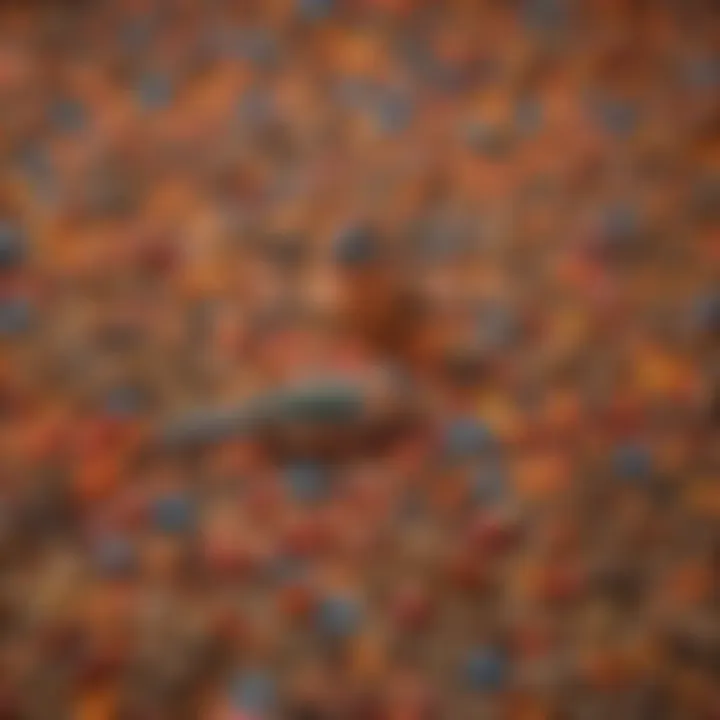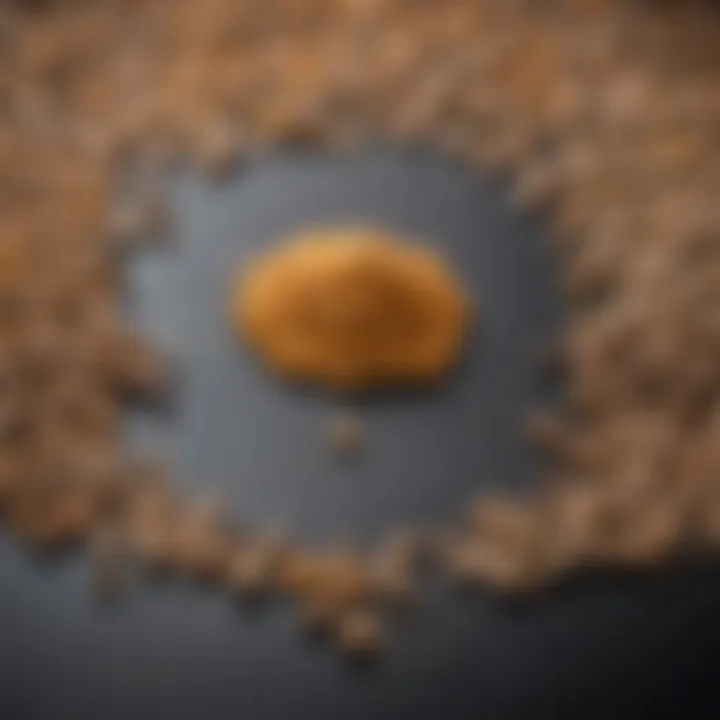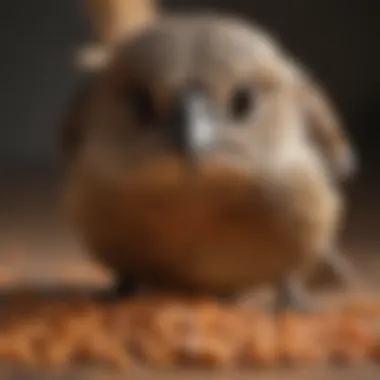The Comprehensive Guide to Pelleted Bird Food


Intro
Pelleted bird food has gained notable popularity among avian enthusiasts for good reason. Understanding what comprises a suitable diet for your feathered companion is vital. This article delves into the specifics of pelleted bird food, allowing pet owners to make informed decisions about their birds’ nutrition and overall health.
A broad array of pellet types and brands exist in the market. However, not all are created equal. It is essential to explore the nutritional needs of your specific bird species to choose the right pellets. Avian health is intricately linked to a well-balanced diet, and this guide aims to clarify the different elements of pelleted food, its advantages, and how to effectively incorporate it into your bird’s feeding regimen.
Understanding Your Pet
Pet Behavior Basics
It is essential to recognize the natural behaviors of birds as they affect how they respond to their diet. For instance, many pet birds are naturally foragers. In the wild, they spend their time searching for a variety of seeds, fruits, and nuts. Understanding this instinct can guide you in selecting a diet that satisfies these needs while complementing the nutritional value of pellets.
Common Breed Characteristics
Different species of birds exhibit distinct traits and dietary preferences. Budgerigars, for example, thrive on a mix of seeds and pellets, while larger species like macaws require higher fat content in their diets. Acknowledging these differences can help in creating an appropriate meal plan that aligns with their unique requirements.
Species-Specific Needs
Tailoring the diet to meet the specific needs of your bird species is crucial. Parrots often need a diet rich in vitamins and minerals to maintain their vibrant colors and high energy levels, while finches may need diets that promote their smaller size needs. Always consult feeding guidelines and recommended diets specific to your bird’s breed.
Pet Care and Maintenance
Feeding Guidelines
When incorporating pelleted bird food into your bird’s diet, follow these guidelines:
- Introduce pellets gradually alongside their current diet.
- Monitor their intake, ensuring they eat a balanced mix of pellets and fresh foods.
- Adjust portion sizes according to their age, weight, and species.
Grooming Essentials
Regular grooming, such as nail trimming and beak maintenance, is vital. Well-groomed birds are generally healthier and more comfortable with their eating habits.
Hygiene Practices
Maintaining a clean environment is key for your bird's health. Remove uneaten food promptly to prevent mold growth. Regularly clean dishes and perches to ensure cleanliness.
Health and Wellness
Routine Vet Check-ups
Regular veterinary visits are essential to monitor your bird’s diet and overall health. These check-ups can help identify any nutritional deficiencies or health problems early on.
Vaccination Needs
Vaccinations are important for preventing illness. Consult with a veterinarian to determine which vaccines are suitable for your bird species.
Recognizing Signs of Illness
Keep an eye out for changes in behavior such as loss of appetite or changes in droppings. Early detection is critical for successful treatment.
Enrichment and Activities
Indoor vs.
Outdoor Activities
Providing adequate mental and physical stimulation is crucial. Indoor activities can include social interaction or foraging opportunities using toys. Outdoor time should be supervised to ensure safety.
Interactive Toys and Games
Incorporate interactive toys to challenge your bird mentally. Foraging toys can help satisfy their natural instincts.
Socialization Opportunities
Birds are social creatures. Engage with your bird frequently, and consider introducing them to other birds. This connection can enhance their emotional well-being.


Taking the time to understand your bird's specific needs and behaviors will lead to better health and an enriched life.
Conclusively, the journey into the world of pelleted bird food offers more than mere sustenance. It enriches the lives of both birds and their owners, fostering a deep bond through thoughtful care and understanding.
Understanding Pelleted Bird Food
Understanding pelleted bird food is vital for every bird owner who aims to provide a balanced, nutritious diet for their avian companions. The development of pelleted diets represents a significant advancement in avian nutrition and pet care. This section delves into key elements of pelleted bird food, its historical background, and diverse types available in the market.
Definition and Overview
Pelleted bird food is a specially formulated feed that combines various ingredients, such as grains, seeds, and vegetables, into a compact, easily digestible form. These pellets deliver a complete nutritional profile tailored to meet the needs of different bird species. This format helps ensure that birds receive a well-rounded nourishment plan, reducing the likelihood of selective eating.
Historical Context and Development
The concept of pelleted bird food evolved primarily in response to the limitations of traditional seed diets. In the past, bird owners often relied solely on seeds, which can lead to nutritional deficiencies and unbalanced diets. Through research and development, manufacturers started creating pelleted diets to provide a more comprehensive nutrient package. This change in perspective has facilitated a shift towards improved health and longevity in pet birds.
Types of Pelleted Bird Food
Pelleted bird food comes in various types, each tailored to different dietary needs and preferences. Understanding these types can help owners make informed choices:
Seed-based Pellets
Seed-based pellets derive their primary ingredients from seeds and are extended with additional nutrients. These pellets are often favored by bird owners who want to retain some familiarity with seeds in their pets' diets. A key characteristic of seed-based pellets is their palatability; many birds find them appealing due to their seed content. However, relying solely on seed-based pellets may not provide a complete nutrient profile as other types might.
Grain-based Pellets
Grain-based pellets contain a significant amount of whole grains such as corn, oat, and barley. These pellets are advantageous because they offer a wider variety of carbohydrates and nutrients. The key attribute of grain-based pellets is their digestibility. Birds often respond well to the texture of these pellets, facilitating easier consumption. Nonetheless, they must ensure that they do not contain too many fillers, which can dilute the nutritional value.
Vegetable-based Pellets
Vegetable-based pellets focus on integrating vegetables as primary ingredients, enriching the pellets with vitamins and minerals. These pellets cater to those bird species that require higher vegetable content in their diet. The key benefit here is the nutritional richness from the variety of vegetables included. However, ensuring all vegetable-based pellets are palatable is crucial because some birds may resist new tastes.
Specialized Diets
Specialized diets cater to specific nutritional needs of certain bird species or health conditions. These diets can include therapeutic formulas that address issues like obesity or feather plucking. The hallmark of specialized diets is their targeted formulation. They are very beneficial for birds with unique health considerations. Nonetheless, they may also be more expensive or harder to find, posing a challenge for owners seeking the best for their companions.
Nutritional Composition of Pelleted Bird Food
Nutritional composition plays a crucial role in avian health and well-being, particularly when it comes to pelleted bird food. The right balance of nutrients can promote growth, enhance immune function, and prevent various health issues among birds. This section explores the essential nutrients found in pelleted diets for birds, and why these components matter significantly for pet owners.
Essential Nutrients for Birds
Proteins
Proteins serve as fundamental building blocks for a bird's body. They contribute to muscle development, feather growth, and overall health. High-quality protein sources in pelleted bird food are typically derived from ingredients like soy, corn, and legumes. These proteins are essential as they provide amino acids, which are vital for tissue repair and growth.
Key characteristics of proteins include their ability to support metabolic functions and maintain energy levels. Their presence makes pelleted food more appealing for many species of birds that rely on a protein-rich diet. A disadvantage, however, can arise if the protein source is not digestible or lacks essential amino acids, leading to potential nutritional imbalances.
Fats
Fats are a dense source of energy for birds, providing essential fats required for optimal body condition. In pelleted diets, fats often come from seeds or oils such as sunflower oil or flaxseed oil. The key characteristic of fats lies in their role as a concentrated energy source. They support multiple bodily functions, including hormone production and absorption of fat-soluble vitamins.
While beneficial, too much fat can lead to obesity, which is a common issue in pet birds. Thus, maintaining a balanced fat ratio is important to avoid any health complications associated with high-fat diets.
Carbohydrates
Carbohydrates are another vital component, offering quick energy for active birds. These nutrients can be sourced from grains and vegetables found in pelleted formulas. Carbohydrates are particularly important for birds that have high energy demands, such as parakeets and cockatiels. Their key characteristic is that they provide easily digestible fuel required for daily activities. However, it is essential to use carbohydrates wisely as an excess can lead to obesity and related health issues. Selecting the right type of carbohydrate, such as whole grains, can make a positive impact on a bird's diet.
Vitamins and Minerals
Vitamins and minerals are integral to the overall dietary composition. A well-formulated pelleted diet will contain a balance of essential vitamins like A, D3, and E, along with minerals such as calcium and phosphorus. These nutrients contribute to a bird's immunity, feather health, and bone strength.
A notable characteristic of vitamins and minerals is their role in metabolic processes and the enhancement of immune responses. They also help in the prevention of deficiencies that can lead to serious health concerns, such as metabolic bone disease. However, excessive supplementation can have adverse effects, making it crucial to choose pelleted diets that are formulated by experts.
Comparative Analysis with Seed Diets
Seed diets are often favored for their palatability and natural appeal to birds. However, they may not provide the comprehensive nutritional support that pelleted diets offer. Pelleted food ensures that birds receive a well-rounded intake of nutrients with each serving. Additionally, the exposure to a diverse range of nutrients through pellets can be beneficial in maintaining consistent health.
By understanding the nutritional composition of pelleted bird food, bird owners can make informed choices that significantly enhance their pets' diets, leading to better overall health and longevity.
Benefits of Pelleted Bird Food


Pelleted bird food is recognized for its numerous advantages in enhancing the health and happiness of pet birds. Understanding these benefits is crucial for caregivers aiming to provide the best nutrition for their avian companions. This section will delve into three key aspects that shed light on why pelleted diets are favorable choices: balanced nutrition, convenience of use, and how they contribute to reduced mess and waste.
Balanced Nutrition
One of the primary benefits of pelleted bird food is its ability to offer balanced nutrition. Unlike seed mixes, which can be unbalanced and lead to selective eating, pellets are designed to deliver a comprehensive nutrient profile in each bite. They typically contain a balanced ratio of essential nutrients that include proteins, fats, vitamins, and minerals. This formulated approach helps to prevent nutritional deficiencies, which can lead to chronic health issues in birds.
Birds, especially those in captivity, require consistent nutrition for optimal health. Pelleted diets ensure that birds receive the necessary macronutrients and micronutrients without the risk of ignoring essential components. For instance, high-quality pelleted foods such as Harrison's, Kaytee, or Zupreem provide a well-rounded mix that supports muscle development, immune function, and feather maintenance. Thus, choosing pelleted bird food plays a key role in fostering long-term health and vitality in pet birds.
Convenience and Ease of Use
Using pelleted bird food offers significant convenience for pet owners. The preparation is straightforward. Birds can immediately start eating the pellets without the additional need for soaking or mixing. This ease of use allows for quicker feeding times and simplifies the daily routine for busy families.
Furthermore, manufacturers often package these pellets in resealable bags, enhancing storage and ensuring freshness over time. A caregiver does not need to worry about molds or attracting pests, common concerns when handling fresh fruits and vegetables. For families with children, this can make it easier to involve them in the daily care of their pets by simplifying the feeding process.
Reduced Waste and Mess
Pelleted bird food contributes to a cleaner environment within a bird's living space. Since pellets are uniformly sized, they are less likely to scatter and create a mess, reducing the amount of spilled food on the floor or in the cage. This characteristic also discourages the waste that can accumulate from whole seeds, as there is typically less leftover food.
Moreover, pelleted diets allow birds to eat consistently without the risk of over-relying on high-fat seeds or treats. This can lead to a more efficient feeding schedule and minimizes the potential for unwanted pest attraction. Cleanliness around a pet bird’s area is not just about aesthetics; it also promotes health by mitigating the chances of bacterial growth and improving overall hygiene.
In summary, pelleted bird food provides balanced nutrition, convenience for caregivers, and a cleaner living space for birds. These aspects collectively contribute to an enhanced quality of life for avian pets, solidifying the case for their inclusion in avian diets.
Ultimately, integrating pelleted bird food into the diet aligns with the responsibilities of pet ownership, ensuring feathered companions thrive in a healthier and more manageable environment.
Considerations When Choosing Pelleted Bird Food
Choosing the right pelleted bird food for avian companions requires careful thought. Understanding the specifics of different bird species, their nutritional needs, and the quality of ingredients are crucial steps. This section highlights these considerations.
Species-Specific Requirements
Different bird species have unique dietary needs. Some birds require a higher protein intake, while others require balanced fats and carbohydrates. For example, larger parrots may need a diet richer in certain seeds compared to smaller birds like canaries.
- Large Parrots: Require more protein and higher fat content. They thrive on pellets fortified with these nutrients.
- Birds of Prey: These birds may need diets higher in protein sourced from animal by-products.
- Canaries and Finches: Often benefit from a lower fat diet, focusing instead on fiber and carbs.
Ensuring that the chosen pelleted food is tailored to the specific needs of the bird can prevent health issues and enhance longevity.
Assessing Quality and Ingredients
Not all pelleted bird food is created equal. It's important for bird owners to examine labels thoroughly to ensure they are selecting high-quality products. Key points to consider include:
- Ingredient List: Whole foods like fruits, vegetables, and grains should be prioritized over fillers such as cornstarch or artificial flavors.
- Nutritional Breakdown: Look for a guaranteed analysis of protein, moisture, fat, and fiber. Pellets that provide a balanced nutritional profile are more beneficial.
- Additives: Avoid products with excessive artificial preservatives or colors. Choose ones that list natural ingredients and beneficial additives, such as probiotics for gut health.
Understanding how to read the nutritional label is vital. This allows bird owners to select food that supports the health of their pets.
Common Misconceptions
There is a range of misconceptions surrounding pelleted bird food that can lead to poor feeding practices.
- Pellets Are Just Colored Nuggets: Many believe that pellets are simply compacted seeds. In reality, they often contain a complex mix of nutrients not found in a seed-only diet.
- Birds Will Always Choose Pellets: Some owners think birds naturally prefer pellets. However, birds often have a propensity for seeds. Gradual introduction of pellets is often necessary for acceptance.
- All Pellets Are the Same: There is a common belief that any pelleted food will suffice for any bird. In fact, diets should cater to the specific species to avoid deficiencies.
Incorporating Pellets into a Bird’s Diet
Pelleted bird food is becoming an essential component of many avian diets. The incorporation of pellets helps ensure a balanced nutrition for pet birds. By supplying necessary vitamins and minerals, pellets can play a critical role in the health of birds. However, many owners face challenges when introducing pellets. Understanding strategies and complementary feeding options can facilitate this transition.
Gradual Transition Strategies
Changing a bird's diet from seeds or other foods to pellets needs careful planning. A sudden shift can lead to stress and rejection of the new food. Therefore, a gradual approach is often recommended. Start by mixing pellets with the current food. Here are some effective steps to consider:
- Start Small: Begin by mixing a small amount of pellets with your bird's regular food. Observe how they react to the new addition.
- Increase Gradually: Over time, increase the ratio of pellets to seeds. This slow transition can help your bird acclimate to the new texture and taste.
- Monitor Eating Habits: Keep an eye on your bird's willingness to eat the pellets. If they are showing resistance, decrease the ratio briefly and try again.
This strategy not only eases the transition but also promotes overall acceptance. Patience is key during this process.
Complementing with Fresh Foods
Alongside incorporating pellets, fresh foods can enhance your bird’s diet and increase the acceptance of pellets. Fresh fruits and vegetables supply essential nutrients that pellets may miss. Here are some options for complementing the diet:


- Fruits: Apples, bananas, and berries are good choices. They can encourage your bird to try new things.
- Vegetables: Leafy greens such as spinach and kale provide fiber and vitamins. Offer a variety of colors and textures.
- Nuts and Seeds: In moderation, these can be a treat that adds appeal. They should not overpower the diet, but can help with acceptance.
Integrating these fresh foods not only improves the diet but also promotes greater palatability. It is important to ensure the fresh options are safe, as some plants can be toxic to birds. Always wash produce to remove pesticides.
In summary, incorporating pellets into a bird's diet requires an understanding of gradual changes and the role of fresh foods. This balanced approach ensures better health outcomes for avian companions.
Palatability and Acceptance Issues
Pelatability and acceptance are crucial when it comes to pelleted bird food. It is not enough for the food to be nutritionally sound; birds must also be willing to eat it. Acceptance issues can lead to refusal of pellets, which defeats the purpose of introducing a balanced diet. Understanding these factors is essential for bird owners seeking to provide the best nutrition for their pets.
Factors Affecting Acceptance
Several factors play a role in how well birds accept pelleted food. These include:
- Familiarity: Birds can be resistant to new foods, especially if they have been fed seeds or other diets for a long time. Familiar tastes and textures may need to be reintroduced gradually.
- Texture and Shape: The physical properties of the pellets can influence acceptance. Some birds prefer softer textures, while others might like harder pellets. The size of the pellets also matters, particularly for smaller species.
- Flavoring: Not all pellets are created equal. Some brands may use flavor enhancers that make their products more appealing. Birds may be more inclined to eat pellets that mimic the flavors of their favorite seeds or fruits.
- Presentation: How the food is presented can affect acceptance. Using various feeding methods, such as mixing pellets with fresh foods or placing them in specific types of feeders, can encourage birds to try the pellets.
Troubleshooting Unwillingness to Eat Pellets
If a bird is hesitant to try pelleted food, there are several strategies that owners can implement to encourage acceptance. Consider the following approaches:
- Gradual Introduction: Start by mixing a small amount of pellets with the bird's current food. Over time, increase the proportion of pellets while decreasing the seeds. This gradual transition helps to ease the bird into accepting the new diet.
- Enhance Flavor: Drenching pellets in bird-safe fruit juices or mixing them with pureed fruits can improve taste and make the food more enticing. Just ensure that any additions are safe for the bird’s species.
- Consistency is Key: Maintain a schedule for feeding. Birds thrive on routine, and presenting pellets at the same times each day may help establish acceptance.
- Observe Preferences: Pay attention to what your bird prefers. If certain types of pellets are more favored than others, it might be effective to focus on those options before expanding their diet further.
- Social Eating: Birds are social creatures. Feeding multiple birds together can increase competition and promote acceptance as they observe others enjoying the pellets.
Understanding why a bird may not accept pellets is just as important as choosing a quality product. Owners must address the barriers and adapt their strategies accordingly.
By taking these factors and strategies into account, pet owners can smooth the path towards a successful pelleted diet. Increased acceptance of pellets will lead to better nutrition and, ultimately, healthier birds.
Long-Term Health Benefits of Pelleted Diets
Pelleted bird food offers significant long-term health benefits for pet birds when integrated into their diet. This section discusses how a pelleted diet can help prevent nutritional deficiencies and assist in weight management for various avian species.
Preventing Nutritional Deficiencies
A well-balanced pelleted diet supplies essential nutrients that birds require for optimal health. Pellets often contain a wide range of vitamins, minerals, and other nutrients necessary for proper growth and development. Unlike seed-based diets, which can be deficient in vital elements, pelleted food aims to provide a complete nutritional profile.
Common deficiencies in birds can lead to serious health issues such as feather plucking, weakened immune systems, and metabolic disorders. Pellets commonly include ingredients like:
- Proteins
- Fats
- Carbohydrates
- Vitamins (like A, D, and E)
- Minerals (like calcium and phosphorus)
Choosing high-quality pellets can greatly reduce the risk of these deficiencies. It is essential for pet owners to research and select brands that prioritize nutritional integrity in their formulations. This consideration can significantly improve a bird's overall health and longevity.
Weight Management and Obesity Prevention
Weight management is a growing concern among pet birds due to sedentary lifestyles and overfeeding. Pelleted diets can help address this issue by providing controlled portions and reducing excess calorie intake. When birds consume a diet composed primarily of pellets, the risk of obesity is substantially decreased, as pellets are often lower in calories than high-fat seeds.
Some benefits of a pelleted diet in relation to weight management are:
- Controlled Nutrition: Pellets typically have a consistent nutritional profile, helping to manage calorie intake effectively.
- Satiety: Quality pellets can create a sense of fullness in birds, reducing the inclination to overeat.
- Regular Feeding Schedules: Offering a fixed amount of pellets at scheduled times encourages healthier eating habits.
By encouraging thoughtful dietary choices, pelleted bird food supports not only the physical but also the mental well-being of companion birds. Sourcing the right pellets and sticking to a consistent feeding routine can results in healthier, happier birds over their lifetimes.
Pelleted diets are not just a matter of preference but are essential for preventing long-term health issues.
The End and Key Takeaways
Summarizing the Importance of Pelleted Bird Food
In this exploration of pelleted bird food, we have illuminated the numerous benefits that these formulated diets offer for pet birds. Pelleted foods are designed to meet the nutritional needs of avian species more effectively than traditional seed mixes. They are a rich source of essential nutrients, contributing to optimal health and longevity. It becomes paramount for bird owners to recognize that pelleted bird food not only supports balanced nutrition but also aids in preventing health issues associated with poor dietary choices.
Some critical aspects to remember include:
- Nutritional Balance: Pelleted food includes proteins, fats, and vitamins tailored to specific avian needs.
- Convenience: These diets are easy to handle and store compared to loose seeds.
- Waste Reduction: Pelleted diets can lead to less mess, making cleaning simpler for owners.
- Fewer Behavioral Issues: A balanced diet can help mitigate aggressive behavior or feather plucking often linked to nutritional deficits.
Effective feeding practices lead to a more harmonious relationship between birds and their owners. Understanding the nutritional requirements for different species helps ensure that pet birds thrive.
Encouraging Informed Feeding Practices
Informed feeding practices are crucial for maintaining the health of pet birds. Owners may often face choices regarding what to feed, and misinformation can lead to serious health complications. Thus, it is essential to prioritize well-researched information and advice when selecting pelleted diets.
Here are considered practices for successful avian feeding:
- Research Species Needs: Not all birds have the same dietary requirements. Familiarize yourself with your bird's specific needs to choose suitable pellets.
- Quality Ingredients: Always assess the ingredient list on packaging. Choose brands that prioritize whole-food ingredients and face minimal additives.
- Gradual Changes: If transitioning from seeds to pellets, do so slowly to prevent digestive issues or refusal to eat.
- Observation and Adjustment: Monitor your bird's weight, behavior, and overall health. Be ready to adjust dietary practices based on these observations.
Encouraging these practices will help pet owners provide a nourishing environment, empowering avian companions to reach their fullest potential.







